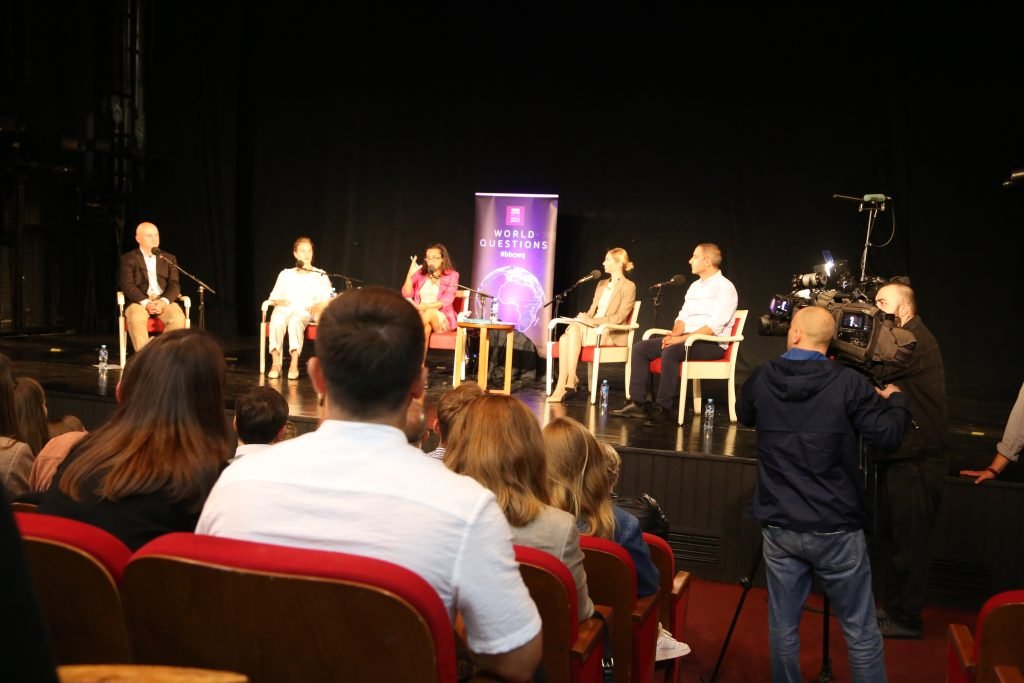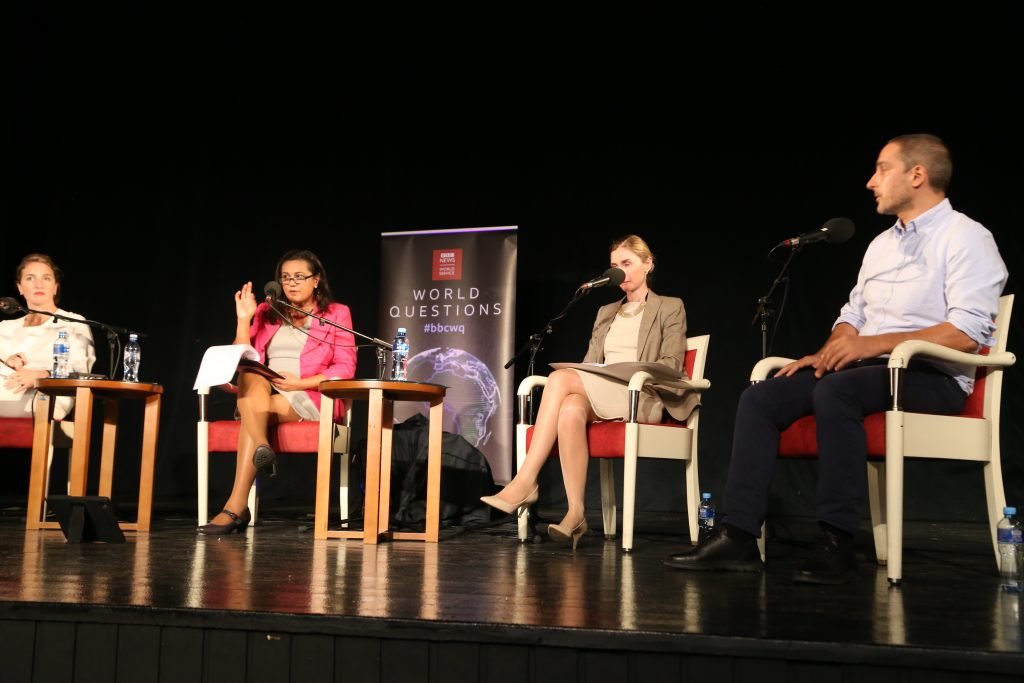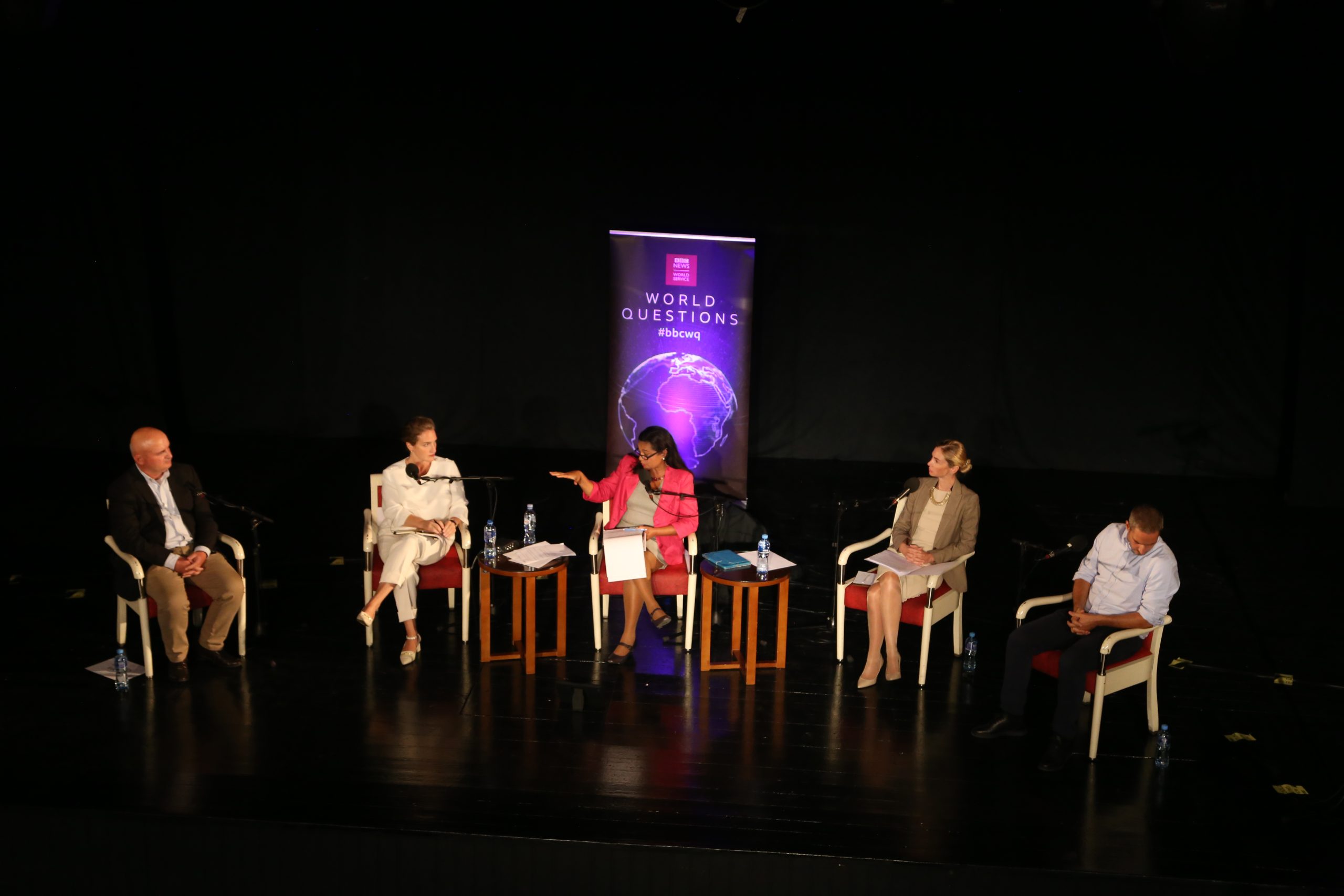BBC World Questions Comes to Georgia, but Does It Find Answers?
BBC World Questions, a program that brings people across the globe to engage in discussion and hold those in power to account, hosted its first discussion in Tbilisi, Georgia. The topics presented by presenter Anu Anand and tackled by the panel encompassed Georgia’s pathway to EU accession, relations with Moscow, freedom and democracy, and the sobering recent climate-related tragedies that have beset the country. The program was aired on September 16 for the audience of millions of BBC listeners around the world. I was invited to attend and follow the discussion as Civil.ge Executive Editor.
Nata Koridze is Civil.ge Managing Editor
Listen to World Questions – World Questions: Georgia – BBC Sounds
Anu Anand began her presentation by talking about Georgia’s anticipation of the decision on the EU candidacy, saying, “This decision is anxiously awaited by the majority of the 3.7 million Georgians.” This is certainly true, but as soon as the programme started, the anchor was confronted with the pervasive political rift, present right there, on the stage of the Liberty Theatre, where the programme was being recorded. The BBC’s desire to foster discussion in Georgia came up against the wall of entrenched opinions, divided speakers and audience, and the divide between them: a reminder of the tense and polarized reality in which Georgians live today.
This, despite an apparent effort being made to balance the panel: MP Mariam Lashkhi, represented the ruling Georgian Dream party while MP Tina Bokuchava spoke on behalf of the largest opposition party, the United National Movement. Philosopher Levan Gambashidze and Professor of Political Science Kornely Kakachia were to be making up the middle between those two stringently opposed political poles.

The sole point of consensus was reached as all participants underscored Georgia’s profound historical and cultural ties to Europe. But that assertion seemed rooted in the cultural affinity rather than the shared political project.
Philosopher Levan Gambashidze referred to this saying that being part of the European Union is important for Georgians also from the philosophical and historical perspective. “Georgia is a European state with a European past,“ he noted, emphasizing that aspiring to Europe has “always“ been the cornerstone of Georgia’s foreign policy.
The key point of contention at the panel was whether the current Georgian administration was doing enough to achieve the European Union membership.
When asked about the plan of the government to fulfill the 12 EU conditions with so little time remaining before the Commission presents its assessment, the ruling party MP Mariam Laskhi predictably said that the conditions of deoligarchization, judicial reform, and political polarization need time, that they cannot be achieved in just a few months. She promptly shifted the blame on the opposition, lamenting the lack of their participation in the ruling party’s efforts to address the EU concerns.
UNM’s Tina Bokuchava noted, “The EU and NATO are the best insurance policies for Georgia against a delusional Putin who wants to restore the Soviet Union.” Bokuchava criticized the Georgian Dream government for the absence of political will to implement the necessary reforms to obtain EU candidate status. As for the opposition’s participation in implementing the EU recommendations, Bokuchava said: “We are part of the political process, but unfortunately, the agency to implement reforms is with the government.”
Professor Kornely Kakachia was cautiously optimistic about Georgia’s potential to become the EU state, but he placed the locus of that optimism outside Georgians’ hands. Rather, in his mind, the European Union’s leaders are eager not to split the Associated Trio of Georgia, Moldova, and Ukraine. Kakachia admitted, though, that Georgia’s actions have dented that eagerness, saying, “Georgia, because of its foreign policy posture, is a little bit isolated lately” due to its “strange” positioning towards Russia and Ukraine. He argued the country has “lost its geopolitical and moral compass.“

The matter of morality – or the lack of it – in current politics was the underlying discussion when the panelists touched upon the questions related to political justice in Georgia, state capture, and the recent news about the impeachment proceedings launched by the government against the incumbent president. As expected, the opinions of the opposition and the ruling party diverged profoundly on that matter, and the grumbling of their supporters from the audience – which one is likely to miss during the broadcast – made the abyss between the positions – and the vitriol mixed into this confrontation – blatantly obvious.
The question about the ways to overcome polarization was tackled directly by the anchor. How could Georgian people unite if the UNM and GD cannot work together? UNM MP Bukuchava said that the government is key to achieving such unity. She pointed out that the government holds political sway over the judiciary, mentioning the case of the former president and the UNM founder, Mikheil Saakashvili. In MP Bokuchava’s politicized justice, the absence of an impartial arbiter makes depolarization impossible.
GD MP Lashkhi dismissed the allegations of politically motivated justice out of hand, saying her party had successfully transformed the nation into a parliamentary republic and pluralistic country. She said nine parties are represented in the Parliament, with tools at their disposal to oversee the government. Many in the audience clearly considered that argument disingenuous, given the overwhelming sway of the ruling major and its satellites in the parliament chamber and their reticence to share power.
Russia and its impact on Georgia’s European aspirations was obviously on everyone’s mind. MP Lashkhi concurred that it’s impossible to maintain good relations with Russia as it is the country’s occupier. At this point, she was confronted by MP Bokuchava who spoke about specific steps made by the GD government for the rapprochement with Russia. MP Bokuchava said joining NATO, rather than the EU, was the surest way to normalize relations with Russia as Putin “is quite hesitant to pick up a fight with any NATO country.’’
Ghambashidze stressed that “the issue of how we treat Russia is the issue of how Russia treats everybody else.” He criticized the ongoing justification by Georgia’s ruling party of its foreign policy toward Russia as being aimed at preserving “peace,” saying, “Russia tries to offer the world peace on their terms.” Russian citizen present in the audience said it was impossible to maintain positive relations with the current Russian government while simultaneously pursuing the EU aspirations.
Unanimity, lack of divisiveness and friendliness reigned only as the final question was posed to the panelists and audience: what is unique about Georgia that it can offer the international community? The answers ranged from food to nature, from the Georgian polyphonic singing tradition to the values of friendship and hospitality. There was no disagreement, only unity and harmony, so unusual and refreshing in the Georgian reality.
What are the key takeaways?
Georgia’s political divisions run deep and make dialogue almost impossible. One wonders to what extent the BBC’s global audience has grasped the issues facing Georgian society. One thing is true – feeling the world’s gaze, the bitter adversaries tend to temper their rhetoric a little, to the point of almost civilized conversation. Not enough, perhaps, to move forward, but in a way that makes room for other, less radicalized opinions to be heard. Ultimately, this is what Georgians expect from the EU – a breathing space to calm their fears and a framework of rules and political culture that might allow the political process to move forward.
